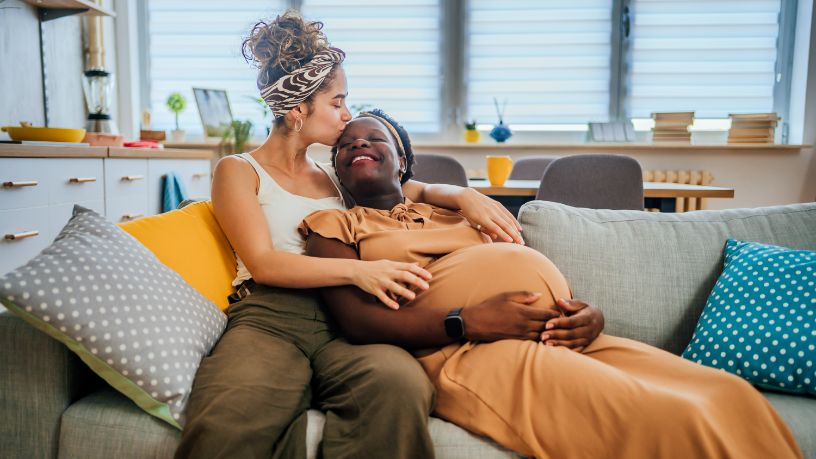Sometimes, well-intentioned comments can be upsetting.
Key takeaways
It’s important to offer your loved ones support, rather than advice.
Learn how to be there for your family and friends, even if you don’t know what to say.
IVF can be a difficult journey. While you might want to give words of support or encouragement to a friend going through the process, it’s important to say the right thing.
When Alice Almeida went through 5 years of IVF, she came to truly appreciate the power of words.
“‘Just relax’ or ‘stop trying’ were repeat offenders from people who thought they were helping,” she says. “You feel like saying, ‘there's a reason why we're doing IVF, so I can't stop doing IVF, and when I do IVF, how am I supposed to stop trying when I'm injecting myself with hormones?’”
“Even my specialist was telling me I needed to relax, but no one was giving me solutions,” she says. “No one ever said, ‘I strongly encourage you to meditate because it will help you relax’.”
But worse than saying the wrong thing is saying nothing at all.
“I had a few friends who just backed out of my life. They just didn't know what to say, so it was easier for them to say nothing,” says Alice. “This is the worst thing you can do. Losing friends just adds to the loneliness and feeling of isolation.”
“I think the most important question you can ask a friend about to go through IVF is ‘how do you want me to support you?’ Some people are really private and want to be left alone, whereas I wanted to talk about it and to have the support.”
Some of the best things her friends did for her while she was going through the process were extremely simple.
One friend called and said ‘you don’t need to say anything, I’m just going to be on the phone. If you want to talk then talk, but if not, I’m just going to stay here because I want to be there for you’.”
Alice’s sister also turned up one evening with a bottle of champagne.
“She said, ‘you don’t need to talk, you just need to have a glass of champagne and we’re here for you’.”
Nobody expects you to give an inspirational speech. “We don’t want to hear that,” says Alice. “We just want to know that somebody is there for us.”
Alice and her husband Sean welcomed their daughter Maya in 2018. They wanted to give her a sibling, but after several more rounds of unsuccessful IVF, they decided to stop trying. Alice eventually fell pregnant naturally with another daughter, Rana.
While she is incredibly grateful for her girls, years of infertility have taken a huge toll on her.
“I came out of IVF feeling battered and broken,” she says. “My marriage was a little bit rocky too because it shakes everything. It doesn't have to be like that.”
How to support a friend going through IVF
- Be there to listen.
- Show compassion and empathy.
- Avoid problem solving.
- Do activities together you both enjoy.
- Understand your friend is grieving the journey to parenthood.
- Remember a failed transfer or a miscarriage is the death of a baby. Treat your friend accordingly.
- Create space to honour lost pregnancies.
- Include your friend in child related events but understand if they don’t want to go.
- Recognise the IVF schedule works in 2 week blocks, so making plans can be difficult.
- Bring them food. Not having to think about cooking can reduce some pressure.
- If you offer support, make sure you follow through.
Don't say:
- “I know how you feel.”
- “Did you hear blah-blah is pregnant? Are you okay?"
- “I’m so excited for you.”
- “I know it will happen for you."
- “You can have one of my kids if it doesn't work."
- “If you just relax and stop thinking about it, then it will happen.”
- “If it's meant to be, it will be."
Do say:
- “What can I do to help?"
- “How do you want me to support you?”
- “You are in my thoughts."
- “I see your journey and I'm here for you no matter what you need."
- “It makes sense that you feel scared.”
- “That sounds so difficult.”

At Bupa, trust is everything
Our health and wellbeing information is regularly reviewed and maintained by a team of healthcare experts, to ensure its relevancy and accuracy. Everyone's health journey is unique and health outcomes vary from person to person.
This content is not a replacement for personalised and specific medical, healthcare, or other professional advice. If you have concerns about your health, see your doctor or other health professional.
You might also like...
Assisted reproductive technology: Why IVF has overtaken GIFT
Assisted reproductive technologies like IVF and GIFT have been helping people get pregnant for decades. But what’s the difference?
9 things you should know before you freeze your eggs
If being a parent is on your long list of priorities and you haven’t met the right person yet, egg freezing may help you buy some time.
12 things to do before getting pregnant
We talked to obstetrician, gynaecologist and fertility specialist Dr Sgroi about things you can do to give you and your baby the healthiest possible start.
3 reasons people are choosing to freeze their eggs
From avoiding panic partnering to putting careers first, we find out why people are banking their eggs to buy more time.





